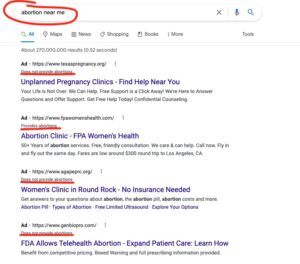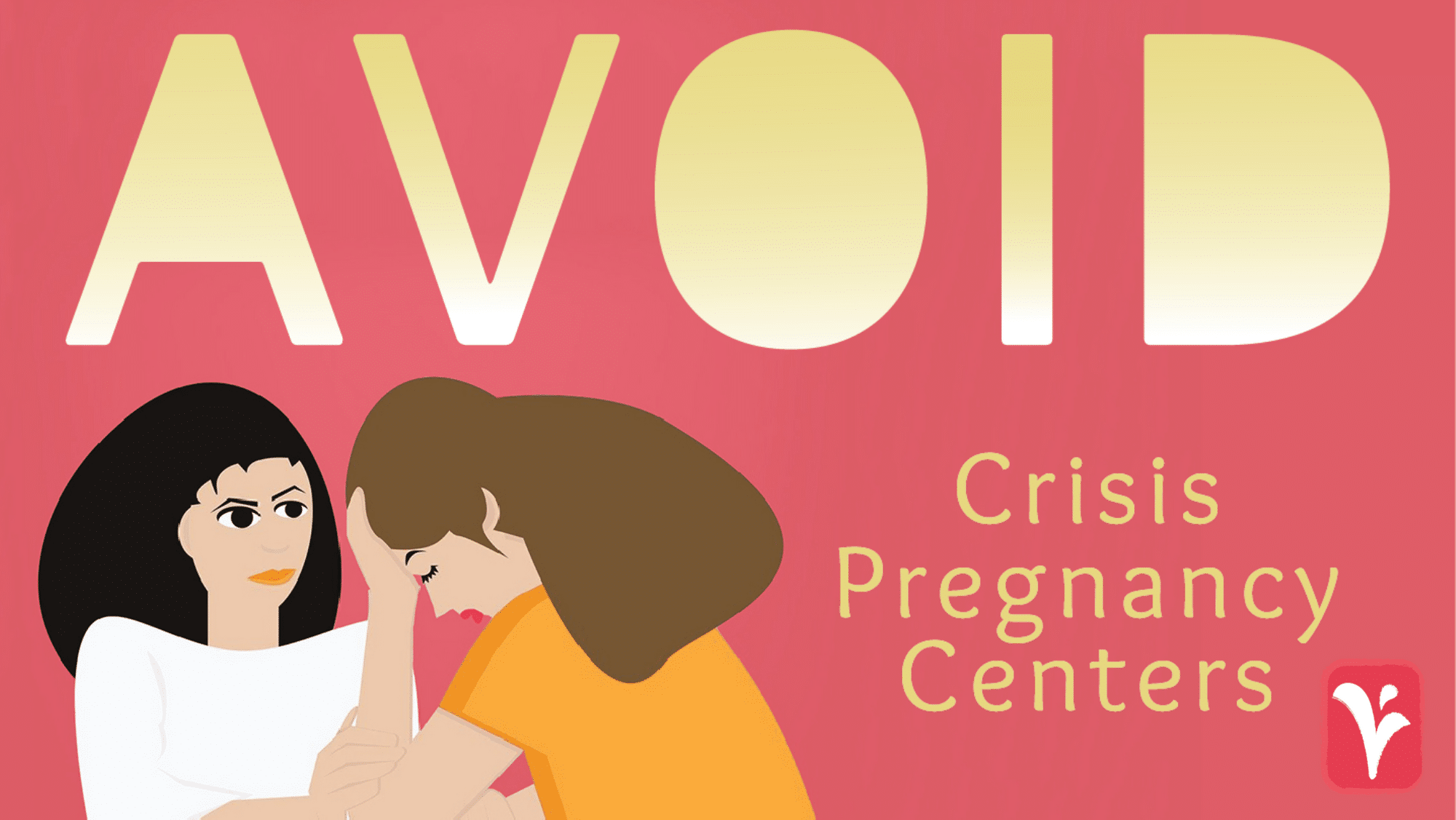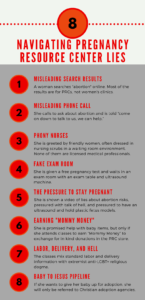How to Discern a Crisis Pregnancy Center From Actual Reproductive Health Facilities
When you Google “abortion services” in Texas, lurking alongside reputable abortion providers, you’ll likely find fake clinics or Crisis Pregnancy Centers (CPCs) in search results. CPCs are nonmedical centers disguised and often parked next to real medical establishments. Despite promoting resources like free pregnancy tests, and free sonograms, these centers are anti-abortion and have been found to provide misinformation on a swath of reproductive health topics, from the care they provide to lying about topics like birth control. Let’s look closer at the issues.
The Truth About Crisis Pregnancy Centers
Unlicensed CPCs are not medical facilities, and they usually aren’t staffed by any medical professionals either, although they might wear scrubs or feature people posing as doctors on their websites. In the U.S., CPCs outnumber abortion clinics by 3 to 1.
In a post-Roe world, CPCs will continue to expand. Those seeking reproductive health care may end up entering the doors of fake clinics. It’s critical for people seeking reproductive care to know that because CPCs are not medical facilities, they are not found by the same federal confidentiality regulations, which puts your privacy at risk.
CPCs may claim to offer resources such as free pregnancy testing, sonograms, free baby items, or referrals for abortion to get people into their facility. A 2022 study published in the International Journal of Women’s Health found that CPCs may lie about gestational age to dissuade people from obtaining an abortion. In a post-Roe world, abortion becomes even more time-sensitive; lying about pregnancy timing might cause someone to schedule an appointment when it’s too late to receive, depending on other states’ restrictions.
CPCs also don’t offer birth control, condoms, facts about childbirth risks, facts about abortion, or facts about patients’ right to medical privacy. Still, they receive millions of dollars in funding from taxpayers under the Alternatives to Abortion program.
NARAL Pro-Choice Texas visited an Austin CPC in 2018 and reported that they used “fear-mongering” language and lies in order to discourage them from having an abortion. They described abortion as painful for both the “zygote” and pregnant person and claimed 90% of people who have abortions become infertile. In reality, abortion doesn’t affect fertility at all when performed in a safe setting. One Texan even said a CPC harassed her and her partner, chasing them out of the facility, “yelling about not killing the baby and how much God loves us.” It can be helpful to learn the signs of CPC’s so you can spot those who are out to mislead you. Know the difference between legitimate providers and CPCs by carefully reading their fine print and terms of service on their websites — even if they claim to offer abortion referrals, it isn’t worth risking a bad experience.
Don’t Call Or Visit Until You Are Sure Who You’re Dealing With
CPCs misleadingly categorize themselves as “women’s health centers” on Google, Yelp and other local websites. While Yelp has taken steps to reduce this problem, Google has not. The consequence of this is when a person searches “abortion clinic” or “where can I get an abortion near me?” on the internet, they may stumble across a CPC listing at the top of the search results because that center paid for this placement even though they do not intend to support a person’s right to an abortion.

These organizations will not counsel you on abortion as an option, even though they bid on “abortion” as a search term with Google Ads to attract pregnant people who need one. They also do not provide reproductive health care.
Common Questions About CPCs
Can a crisis pregnancy center provide me with an ultrasound?
While some CPCs may offer sonogram services for free, staff have been known to lie about the results so the pregnant person doesn’t think abortion is an option. The person might be told they aren’t pregnant altogether. This is especially harmful to people who may be experiencing an ectopic pregnancy, which can be life-threatening.
People may think they can save money by going to the CPC instead, but even before Texas’ S.B.8, ultrasounds needed to be performed by the same doctor providing the abortion. This means even if the sonogram the CPC provided was real, it couldn’t be used at the abortion clinic. Because this causes the pregnant person to miss their appointment, patients become at risk of delaying their abortion care and facing additional barriers from increased costs.
Can a crisis pregnancy center provide me with an abortion?
No. Abortions can only be performed at a licensed abortion clinic, and CPC’s are not medical facilities nor do they hold any medical licenses. Sometimes CPC’s will claim to provide “abortion referrals” and counseling, but the experiences patients have are not grounded in medical science, compassion, or truth. The Wisconsin Alliance for Women’s Health lists these signs to look for when trying to determine if you’re speaking to a crisis pregnancy center:
- They are not willing to give you any information about their services over the phone or require that you visit them in person. A center that is not upfront about their services is probably hiding something.
- The center’s website or printed materials don’t mention any licensed medical staff.
- They tell pregnant people that they are either too early or too late for an abortion.
- They require visitors to read or listen to religious materials.
Crisis Pregnancy Centers in Austin
Some CPCs you may encounter in Austin are the following:
- Pregnancy Help Center of Williamson County
- Agape Pregnancy Resource Center
- Pflugerville Pregnancy Resource Center
- Austin Pregnancy Resource Center
- Heart of Texas Pregnancy Resource Center
- TruCare Pregnancy Center
- Austin LifeCare/TheSource
Crisis Pregnancy Centers Outside of Austin
If you live outside of the Austin area, Repro-action provides a Fake Clinic Database on its website. You can search by city or state to view crisis pregnancy centers in your specific area in order to avoid them.
You can also visit Expose Fake Clinics map and zoom in on a state to identify the CPCs there.
To find a licensed abortion clinic outside of Austin, you can visit the National Abortion Federation’s clinic locator here. You can also visit this locator which will not only direct you to your nearest clinic but also connects you with funding resources should you need it!
Tips For Spotting a CPC
- Pay attention to language. Verbiage such as “pregnancy resource center” or “pregnancy options” in a title is usually a sign that it’s a fake clinic.
- Check Google reviews—most of the time if people write that they’ve received free diapers from a center, it’s a CPC and not actual reproductive health care
- If anything on the website (such as abortion pill “reversal”, lies about abortion being linked to infertility or breast cancer, or general vague information about services provided) raises concern for you, go with your gut!
- Verify with the Expose Fake Clinics map or Fake Clinics database.
Where Can I Get An Abortion in Austin?
The Texas Supreme Court reinstated a pre-Roe abortion ban, banning all abortions in the state. While we cannot provide abortion care at this time, we will still refer you to services out of state and provide a range of early pregnancy assessment services. Steering clear of CPCs means getting the healthcare you deserve.
At Austin Women’s Health Center, we’re committed to providing you with quality, patient-centered care. Unlike CPCs, we support you in all pregnancy outcomes — and we’ll always provide you with evidence-based information.

